The endorphins from the World Cup are still wearing off, and several of us are procrastinating thinking about the season ahead by remembering its best moments fondly. Unfortunately, as is the case with all World Cups, it’s impossible to think about the games, without their soundtrack. Remembering the good times means remembering the commentary as well. There’s the sudden panic that engulfs a team on the mic when they realize they know next to nothing about entire countries (usually non-white ones), or the seconds of dead air after a commentator flubs a name and tries to pull up whatever fun fact they internalized from the fact sheet meant to stand in for the last four years of research. For those with the fortitude not to mute their TVs, the cliches are inevitable: comments about “pace and power” if its a team from Africa, “discipline and hard work” for Asian teams, and “passion and hot-headedness” about Latin American squads. There is, of course, nothing new about commentators relying on lazy and incorrect stereotypes, but due to many international players, and especially international women, being less well known, each time another World Cup rolls around, we’re treated to an egregious increase in just how often we hear those cliches substitute for actual analysis. This World Cup was no different. Nigeria were repeatedly referred to as “physical” and were told to rely on their “physical presence” because it was their main strength (Michael Caley had an excellent thread breaking down exactly why this assertion falls short.). China, despite having one of the most physical teams in the tournament, were almost always described as “disciplined.” (Very disciplined high tackles flying everywhere.) Fox Sports commentators gave us an absolute gem when they said the white, European coach that Nigeria had brought on was responsible for the team’s newfound discipline and tactical knowledge. The problem with relying on stereotypes instead of giving non-Western teams and non-white players nuance and consideration was highlighted perfectly in the aftermath of the England vs. Cameroon game. Sure, the Cameroonian players conducted themselves in an unsportsmanlike way, but the narrative that reared its ugly head after the final whistle was the natural successor to “pace and power”: denigrating the players and the team, turning their emotions into yet another caricature of “angry black women,” and holding them responsible for what little girls watching football would think of the game. It should be possible to both recognize Cameroon’s unsporting conduct for what it was, and also understand that the reaction to that conduct was built upon the same lazy tropes that can substitute for analysis when the players are on the pitch. It's that kind of disparity which led FIFA to open up a disciplinary case against Cameroon after a full day of media outrage despite the fact that they never did anything similar after matches like the Battle of Nuremberg, a game some might argue was one of the least disciplined ever played. But it’s a complicated world out there and there’s no way to clearly show the correlation between clumsy (and damaging) stereotypes employed by commentators and the media and the ways in which the sport becomes hostile to non-white players and fans--whether they’re on a national team or playing for their clubs. Luckily for us, we’re in that peculiar bit of time where everything is a bit fuzzy and there’s a bit of room between all our ears before our regular programming begins. So, in the interest of everyone being just a bit more accurate about how we talk about the players we’re watching, here’s a handy guide to some other adjectives and phrases commentators could learn before they sit down for their next game:
Intelligent
Football intelligence comes in many different forms, of course, and the adjective can be applied to several players that demonstrate many individual skills. Take Cameroon’s Ajara Nchout for example. Nchout emerged from this World Cup as the undisputed champion of dribbling with an average of 6.14 successful dribbles per 90 minutes. It takes incredible control and decision-making to be achieve a success rate that high. It’s not that she isn’t athletic, but ascribing her dribbling success only to athleticism and not crediting her on ball control paints an incomplete picture, a picture heavily influenced by the preconceived notions of those talking about her 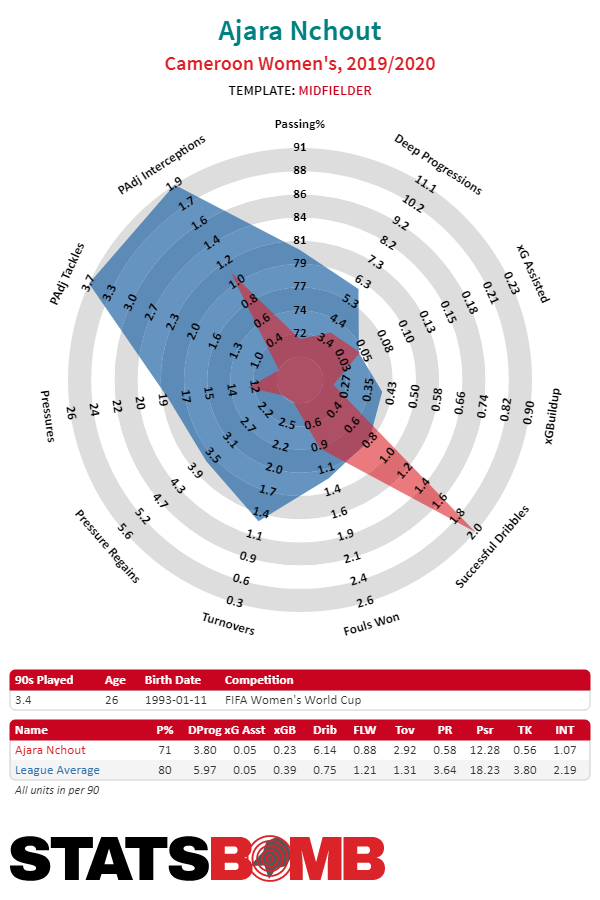 Similarly, Jun Endo is surely disciplined, but watching her on the pitch and the adjectives that come to mind are almost entirely focused on how quick and versatile she is with the ball, and how good she is at reading the pitch as she’s moving the ball forward.
Similarly, Jun Endo is surely disciplined, but watching her on the pitch and the adjectives that come to mind are almost entirely focused on how quick and versatile she is with the ball, and how good she is at reading the pitch as she’s moving the ball forward. 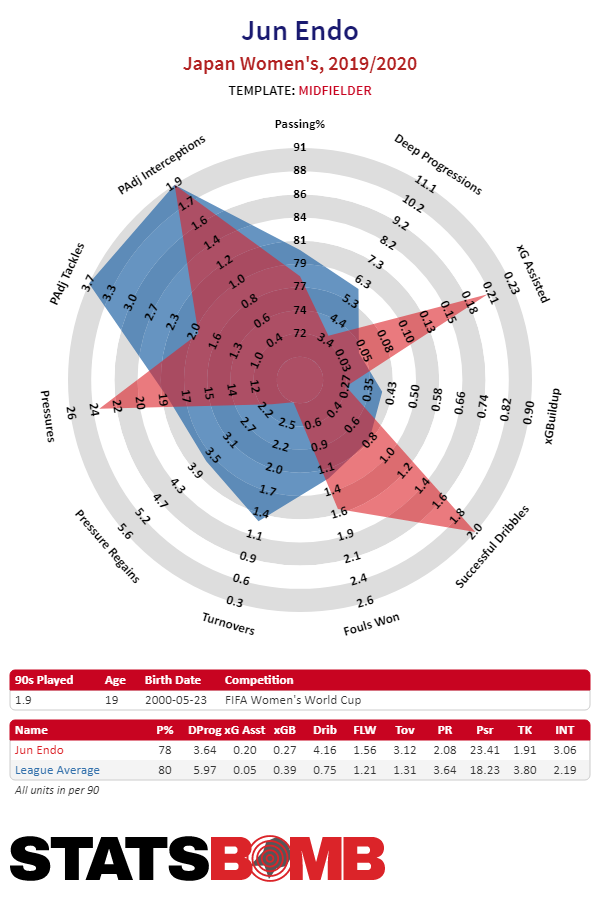
Creative
Let’s spin this one forward and talk about how we might use a word like creative in the upcoming season. It’s almost always reserved for the playmakers on a team, a category that should include Sadio Mané. Liverpool’s incredible 2018/19 season was in no small part due to Mané's was ability to create scoring chances, and pile the pressure on every single opponent. Sure, Mané’s fast, but it's not just that he's fast. He moves the ball forward but he does it while rarely leaving himself exposed defensively. He finds ways to be a dynamic attacking player while not shirking his defensive duties (or having a system that relieves him of defensive responsibilities). Creativity isn’t just what happens when a player or their team has the ball. The heatmap of his defensive activity is amazing because it shows just how active he is able to be while still being one of the league’s best at getting forward from his wide position. 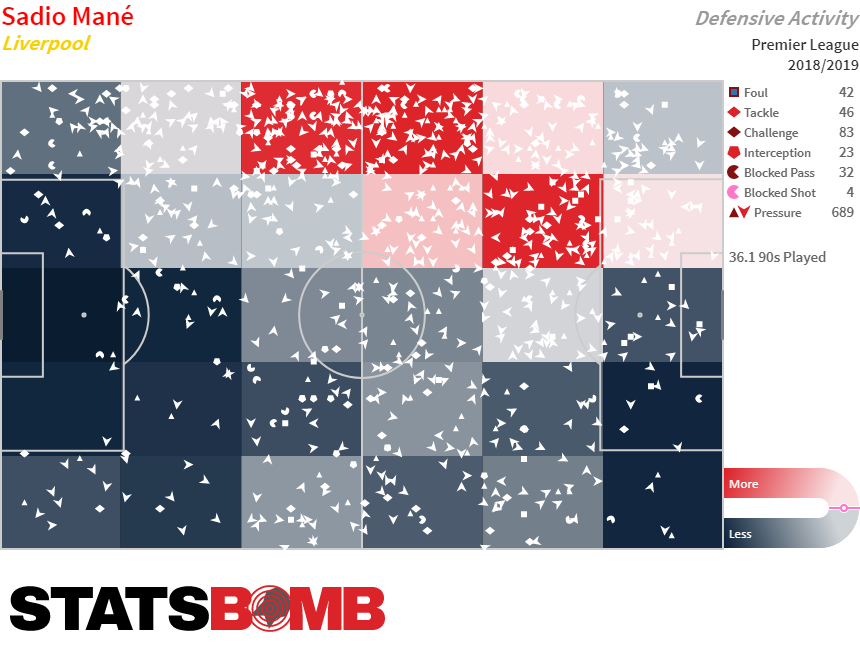
Incredible read of the game (Tactical acumen)
The other thing the best playmakers need is an incredible ability to read the game. Manchester United had a largely disappointing campaign last season, and there’s a lot that can be (and has been) said about why that was, including about the performances of both Romelu Lukaku and Paul Pogba. But putting the toxicity of the last season, and the football media in general, aside, it’s very hard not to describe both players as having incredible tactical acumen and a game-winning ability to read the pitch. Lukaku has perhaps one of the most iconic creative plays in recent memory under his built, one which didn’t even necessitate him touching the ball. Nacer Chadli’s goal in the 2018 World Cup is only memorable because of Lukaku’s dummy: the perfect move that drew attention away from Chadli and allowed the latter to catch the Japanese defense and goalkeeper, Eiji Kawashima, off guard. 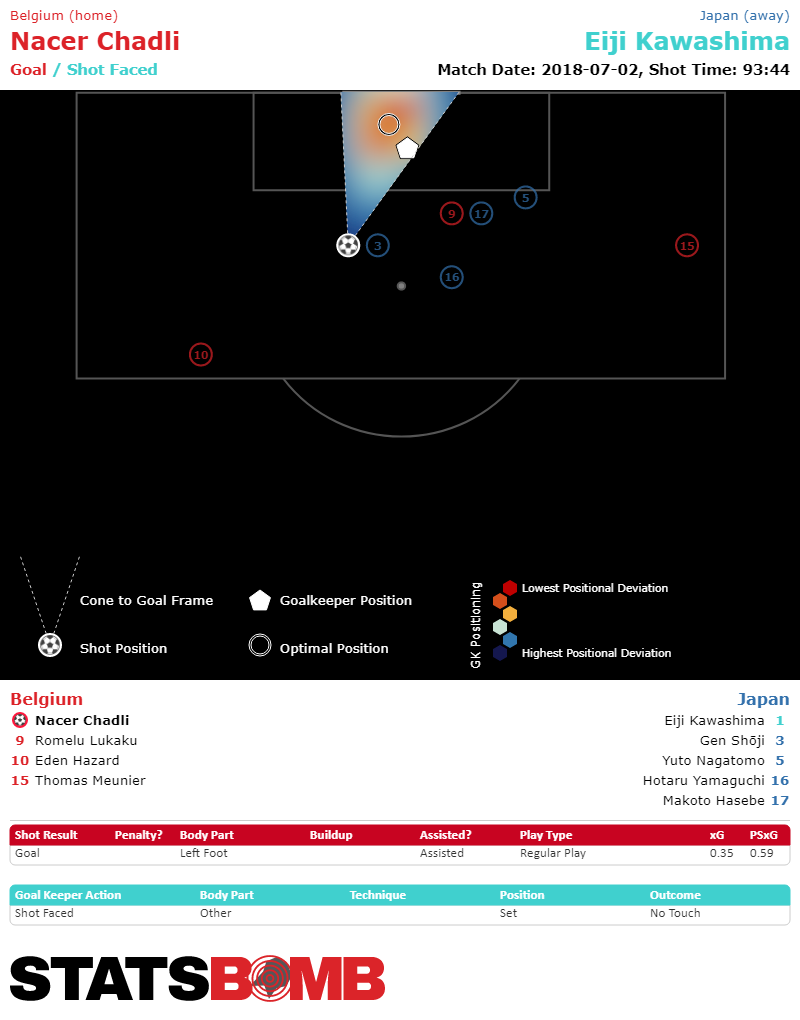 That ability to read the game also results in Lukaku finding space for himself in the penalty area and habitually taking great shots. His 0.20 expected goals per shot was by far the highest on Manchester United last season.
That ability to read the game also results in Lukaku finding space for himself in the penalty area and habitually taking great shots. His 0.20 expected goals per shot was by far the highest on Manchester United last season. 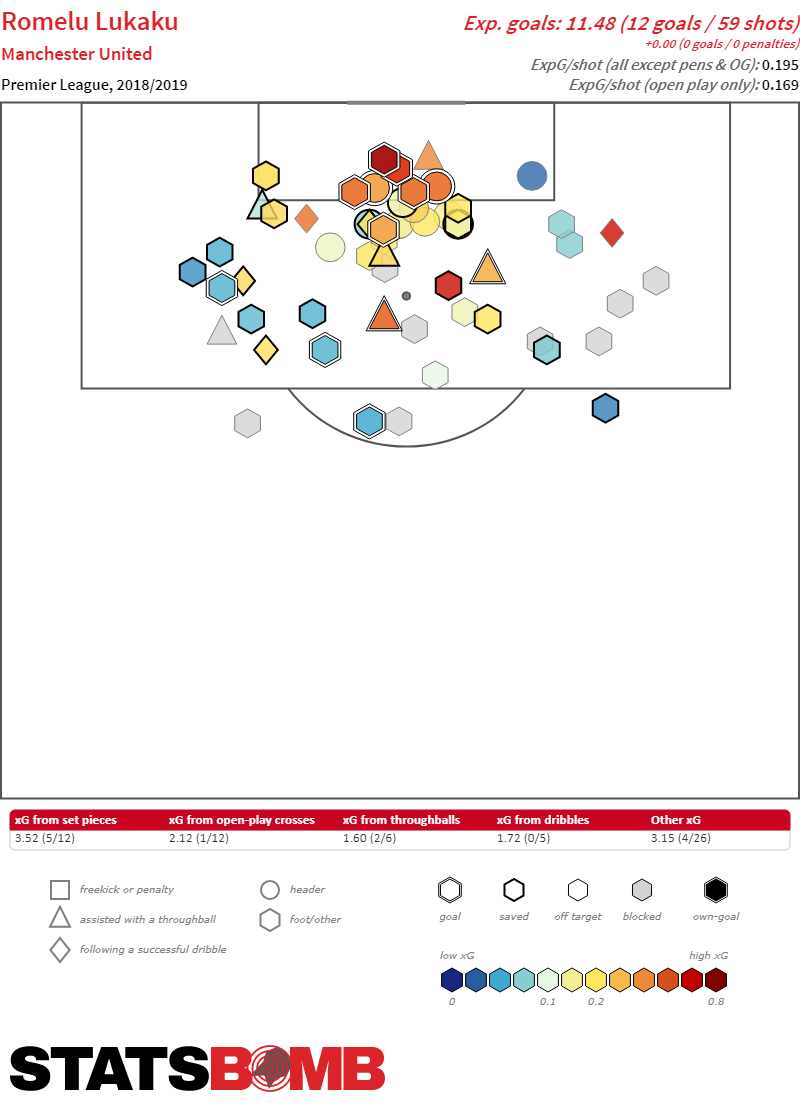 As for Pogba, whatever faults he might have as a player, his ability to see the pitch is beyond reproach. His 8.44 deep progressions per 90 minutes led the team. And he reliably stepped to just behind the 18 yard box on the left and tried to slip passes to the forwards in front of him. Here are all his passes to Marcus Rashford from those positions (red are complete and yellow incomplete)
As for Pogba, whatever faults he might have as a player, his ability to see the pitch is beyond reproach. His 8.44 deep progressions per 90 minutes led the team. And he reliably stepped to just behind the 18 yard box on the left and tried to slip passes to the forwards in front of him. Here are all his passes to Marcus Rashford from those positions (red are complete and yellow incomplete) 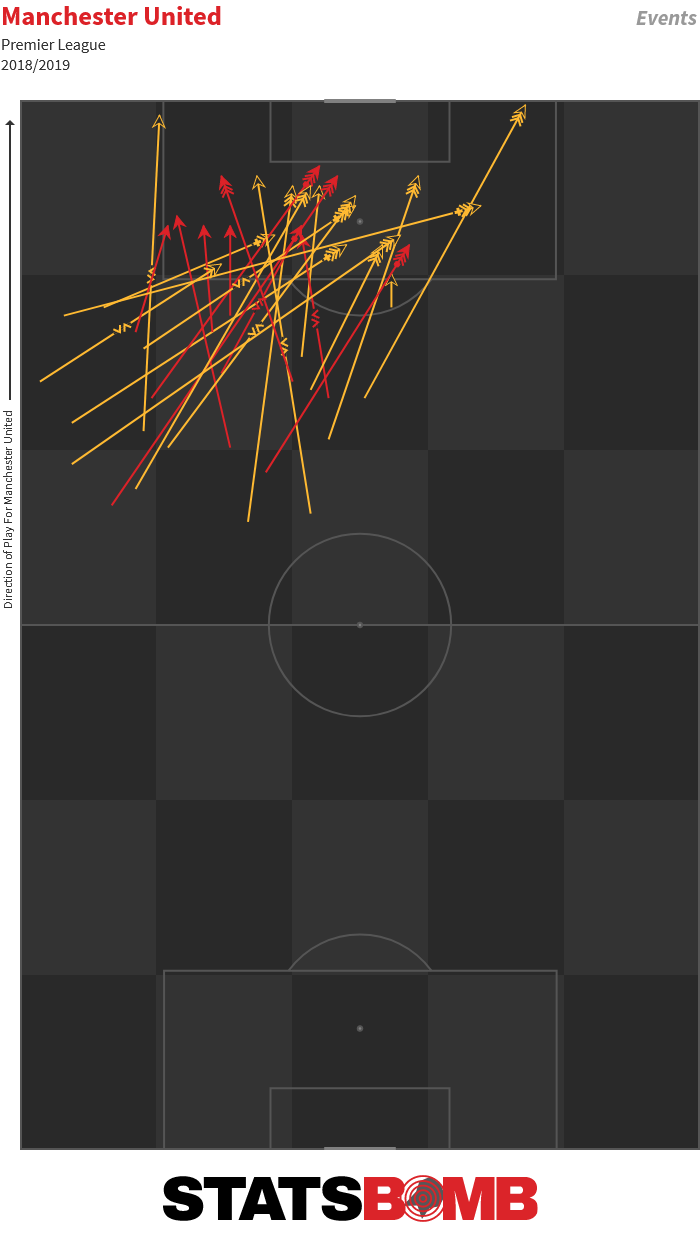 Manchester United had plenty of issues, and Lukaku and Pogba might have had imperfect seasons, but it certainly wasn’t their inability to read the game that was the problem. Lukaku and Pogba are both incredibly smart players, despite what lazy preconceived notions might suggest. Relying on stereotypes is easy. It’s also lazy and damaging, and sells the players and the game short. And, in addition to the harm it does, it’s also just plain wrong. Tropes lead to misdiagnosing what’s going on the field, and making mistakes in analysis. It shouldn’t be too much to ask for commentators to actually analyse what’s in front of them instead of relying on cliches which lead them to make bad conclusions and leave an audience ill informed. And to maybe purchase a thesaurus or two while they’re at it.
Manchester United had plenty of issues, and Lukaku and Pogba might have had imperfect seasons, but it certainly wasn’t their inability to read the game that was the problem. Lukaku and Pogba are both incredibly smart players, despite what lazy preconceived notions might suggest. Relying on stereotypes is easy. It’s also lazy and damaging, and sells the players and the game short. And, in addition to the harm it does, it’s also just plain wrong. Tropes lead to misdiagnosing what’s going on the field, and making mistakes in analysis. It shouldn’t be too much to ask for commentators to actually analyse what’s in front of them instead of relying on cliches which lead them to make bad conclusions and leave an audience ill informed. And to maybe purchase a thesaurus or two while they’re at it.